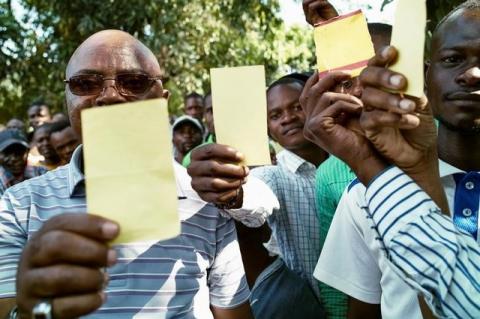Advertisement
Congo capital silent amid general strike against poll delay
KINSHASA (Reuters) - The usually bustling streets of Democratic Republic of Congo capital Kinshasa were nearly empty on Wednesday amid a general strike called by the opposition to press President Joseph Kabila to step down in December.
Kabila's two-term mandate expires in December, but the country's ruling coalition and other smaller parties agreed last week to postpone November elections until April 2018, citing logistical problems registering millions of voters. Congo's top court also approved a delay on Monday.
The country's main opposition bloc says Kabila is using the delay to cling onto power. His allies say he will respect the constitution.
Last month dozens died in two days of protests in Kinshasa against the election delays, prompting strong criticism of police aggression from rights groups.
Activity in the city of more than 10 million people was nearly paralysed on Wednesday, despite calls by the government to avoid the strike.
One of Kinshasa's main roads, Boulevard Lumumba, normally thick with morning traffic, was empty on Wednesday and a deep quiet replaced the usual sound of car horns. Almost no stores were open and most public transport was not running, forcing the few who headed to work to walk.
Police in riot gear patrolled the streets, but there was little to do.
"We want Kabila to leave power on December 19. We are going to march until he resigns," said Moise Miya, a 26-year-old delivery man for a store in north Kinshasa who was not working on Wednesday.
Wednesday's strike appeared to be a success for the Congo opposition, and showed growing support. A similar strike called in August was only partially successful.
"The opposition has won today, they have scored points," said Emile Ngandu, a motorcycle driver at the city's central bus station where buses normally packed with people sat idle. Ngandu normally makes about $12 by 9:30 a.m., but this morning had made just $2. "If I don't work, I am not going to eat," he said.
In the eastern city of Goma, over 1,000 people marched on the office of the governor of North Kivu, chanting against the agreement to postpone the election and lighting fires in the street, witnesses told Reuters. Police fired tear gas to disperse them, they said.
(Reporting by Aaron Ross and Kenny Katombe; Writing by Edward McAllister and Matt Bigg; Editing by Dominic Evans)



















Add new comment